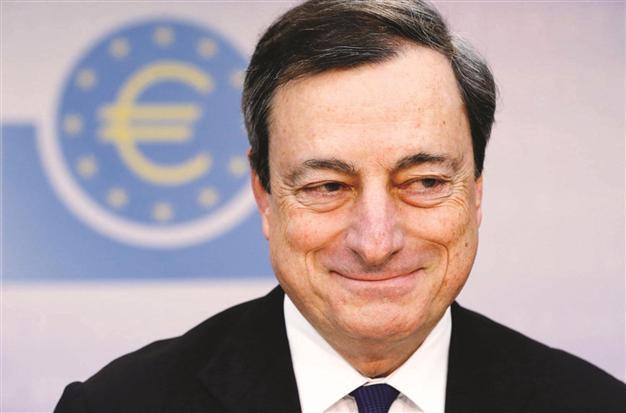ECB holds rate low amid fragile eurozone recov
FRANKFURT - Agence France-Presse

President of European Central Bank Mario Draghi during a news conference in Frankfurt Dec 5. AP Photo
The European Central Bank has held its key interest rate at a record low of 0.25 percent, while raising its forecast for the eurozone’s gradual recovery despite prolonged low inflation.
Like central banks in the United States, Japan and elsewhere, the ECB has used super-low rates and injected liquidity into the financial system to encourage lending and thereby boost investment and consumer spending.
ECB President Mario Draghi said the cheap money would keep flowing, reiterating that he expected “key rates to remain at present or lower levels for an extended period of time.” “Our monetary policy stance will remain accommodative for as long as necessary, and will thereby continue to assist the gradual economic recovery in the euro area,” he said.
Shrinkage expectationsThe ECB maintained its forecast that the economy of the 17-member currency bloc would this year shrink 0.4 percent, but predicted 1.1 percent growth next year, up from an earlier forecast of 1.0 percent.
In 2015, gross domestic product growth should reach 1.5 percent, predicted Draghi in a Frankfurt press conference on the bank’s quarterly macroeconomic projections.
Economic activity should benefit from “a gradual strengthening of exports” and an improvement in domestic demand, said Draghi, pointing out however that “unemployment in the euro area remains high”. Other downside risks include higher commodity prices and “slow or insufficient implementation of structural reforms in euro area countries”.
ECB’s interest rate decision was in line with market expectations. “Three weeks before Christmas, the ECB took a pause in action,” said Christian Schulz of Berenberg Bank. “With inflation a little bit higher, unemployment tentatively stabilizing and leading indicators pointing to a slightly firming recovery, the ECB did not see a need for immediate further action.” Schulz added however that the growth forecasts “seem modestly optimistic”. Tom Rogers, senior economic adviser to EY Eurozone Forecast, also said the forecast for 1.1 percent growth in 2014 “seems a little on the optimistic side.”
Draghi also said that the eurozone may experience “a prolonged period of low inflation to be followed by gradual upward movement.” The bank lowered its inflation forecast for this year and next, predicting a rate of 1.4 percent in 2013 and 1.1 percent in 2014, followed by 1.3 percent in 2015. The bank’s stated central aim is to ensure price stability, which it defines as an inflation rate close to but below 2.0 percent. It is at pains to avoid deflation, a trend where real prices fall, encouraging consumers to put off purchases in hopes of further price drops, which leads to a spiral of falling prices, wages and output.
The current low inflation rate has raised concerns, which led the ECB last month to a surprise cut of its central “refi” refinancing rate by a quarter-point to 0.25 percent, an all-time low it maintained.
